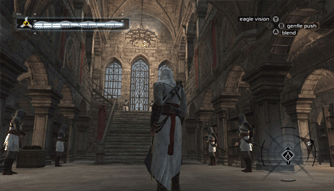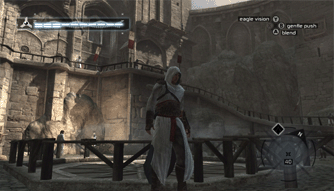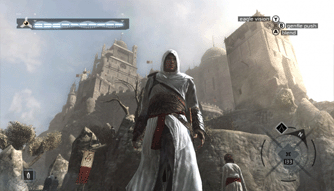I wish I were a hitman. Seriously. From Agent 47 to Leon, they get the best of everything—the biggest guns, the fastest cars, the smartest getaways and the very best of lines. There’s not a single hitman depicted in popular media that I don’t want to be. That’s what I thought before I had the misfortune to play Assassin’s Creed.
Don’t get me wrong, though. It’s not that I don’t like Assassin’s Creed (in fact, I think it’s quite good), but the main character Altair is initially the most annoying videogame character of all time. He’s infuriatingly arrogant, malicious and a nasty little liar. In fact, he cares so little about his brother assassins that I was tempted to walk him off a cliff just to teach him a lesson. If Ubisoft Montreal were trying to alienate their audience from their protagonist from the start, mission accomplished. They appear to have missed a key factor in designing anti-heroes—despite their evil deeds, the reader, the moviegoer or the gamer should secretly, deep down want to be them. Simply put, my impression of Altair is that not even his own mother could love him.
In case you’ve been living under a rock without WiFi and a laptop for the last year (and only woodlouse for mates), let me take a step back. Assassin’s Creed is the latest offering from the team who brought us Splinter Cell and the most recent Prince of Persia reinventions. The game has been shrouded in secrecy since day one, with the plot details kept from the press and what little we did know hyped up to the rafters. A great many talking heads were heard to comment on features as being “truly next-gen.” Pigs flew and donkeys danced the can-can down the streets of Bristol.
So, basically, the usual.
The problem with hype and secrecy is that it gets our hopes up. Gamers can have great expectations if encouraged, and great ire if provoked. If legendary things are promised, but only great things delivered, we as a collective have short tempers (and short memories). The unfortunate side-effect of this is that genuinely entertaining games can get swept under by a tide of tantrums and tears. Assassin’s Creed may well be one of those games.
Despite my misgivings, I’ve found myself hooked on this game since its release. Ubisoft has excelled in creating an intriguingly deep, living, breathing world in which to wander, climb and kill. The cities of the past have been recreated with a flair for the finest of details and genuine atmosphere of the medieval days of yore (so far as I’m aware). Unless you’re that bloke off Time Team, you might well think the same. Walking through busy bazaars, bumping shoulders with the crowds and batting away the pleading hands of beggars, you really do get a sense of “being there.” The graphics are stupendous, with beautiful vistas of huge cities seemingly around every turn. The framerate veritably slides along like silk, with only the most minor of shudders when the game autosaves.
The crowds themselves are one of those “truly next-gen” features that were discussed before the release of the game. Moving through them without causing a ruckus is achieved by holding down the B button. Altair will use his hands to push people out of his way, or lean his body to slip between them. Every character, every NPC onscreen has momentum, weight and body. Bump someone out of your way, and they’ll get angry at you. Bump them into a woman carrying a jar on her head, and she’ll drop it and get angry at them. Everyone in the crowd is a thinking AI process, constantly watching and evaluating. Slip through unnoticed, and no one will be the wiser. Take part in less socially acceptable behaviour, like running up walls or simply running through a crowd and they will remark upon it, their suspicions raised. Continue to irritate or act irrationally and they will report you to the city guards.
After a while, you adjust to the fact that you can’t act unreasonably all the time and expect to get away with it (just like in real life). Instead, you start to insinuate yourself through crowds, use ladders to gain access to the rooftops and generally avoid raising suspicions. As a gameplay mechanic, it is highly effective, drawing the player into the world of disguise and intrigue.
Another effective mechanic is the system of free-running and climbing that gives you access to the rooftops, for use in getaways and accessing View Points, which unlock map information once reached (as well as spinning the camera around the city, showing off the graphics to stunning effect). Holding down the right trigger and the A button while moving Altair allows him to sprint and run or clamber up any obstacle in his way. Once onto a wall with suitable handholds, you climb, pushing the left analogue stick in the direction necessary to find the next handhold. Again, the sense of immersion is perfect, as Altair will move up the wall with his hands and feet exactly placed on every outcropping or crack, and,most impressively, shifting his body to mimic the exact movements you would expect of someone scaling that wall.
The whole thing can’t be scripted, so there must be some clever technology whirling along in the background to give an exact climbing solution for each situation. It’s certainly impressive, and produces some indisputably breathtaking moments of daredevil free-running, with flowing, natural momentum and adrenaline-pumping drops.
Of course, killing is the real aim of the game. As fun as free-running is, the title says “Assassin” and so assassins we must be. Altair is tasked with planning and executing (pun intended) the murder of nine men within the cities of Damascus, Acre and Jerusalem, at the time of Richard the Lionheart’s Crusades. In order to get close to these targets, Altair must investigate their whereabouts, habits and temperament. This involves a series of somewhat repetitive missions, which include eavesdropping, pick pocketing and beating informers senseless until they spill the beans.
As interesting as these may sound, however, they really are all the same. Pick pocketing involves walking behind your target and holding down the B button when they’re not looking. Eavesdropping is even more inane, with Altair charged with the important task of sitting on a bench before witnessing a cutscene. That’s it. Those seeking depth must look elsewhere, as every minigame mission plays out in exactly the same way. However, in my experience, they remain somewhat compulsive, despite their inanity, as the general plot of each planed murder is interesting in itself.
Luckily, the killings themselves are more entertaining. Altair comes equipped with a basic set of weapons, at least initially. There’s the standard issue sword, handy for slicing and dicing, as well as a nasty little blade that shoots out from a presumably complex machine on his left arm. Performing well, like the good little murderous bastard you secretly are, will unlock additional equipment and abilities, though the first few could well serve you throughout the entire game.
Once your investigation is complete, you make a bee-line for your target and attempt to slice his gizzard (whatever that is). Given that Altair is more of a blending in with the crowd before jumping on your chest and stabbing you in the throat sort of guy, rather than you traditional skulking in the shadows type, the murders are exhilarating. You get in close, blend in with the other faces in the crowd, then strike when the time is right. It may be a deviation from the long-range, stealth-heavy Hitman Agent 47-style of assassination, but it works just as well. Once your target is down, you have to run like the wind, as the now unemployed bodyguards are likely to be less than amused with your skulduggery. Getting back to your hideout is an exercise in cunning, blending into the crowds or slipping unnoticed overheard. If rumbled, Altair has a choice—run and hide or attempt to tackle the combat system.
Combat, hand-to-hand, is a disappointingly simple, shallow experience. Basically, the X button fast attacks, holding down the X button strong attacks, and the right trigger defends. Once the countering ability has been unlocked, the player doesn’t even need them, as it allows one hit kills with showy, but entirely scripted, death blows. The AI doesn’t even put up much of a fight either, with entire groups of enemies working without any degree of teamwork or strategy. Most of the time, they just stand waiting for you to attack rather than making a move themselves. The melee combat is simply too impersonal and too simplified to work well, and is one of the most disappointing factors of the game. I wasn’t expecting Ninja Gaiden levels of combat, but something deeper would have galled less.
The graphics, as I have already mentioned, are simply astounding. Coupled with that, the sounds of the cities have also been nicely recreated, with the shouts, screams and general hubbub sounding excellent. The voice acting is also good, with nary the merest hint of the cheesy talentless fools who inevitably ham it up in games. My sole reservation would be that the game hasn’t got enough variation in what the average body on the street says. Phrases are often repeated, as are the speeches of the various public speakers and crazies who wander the alleyways and stand on soapboxes to harangue the crowds.
In a way, most of the criticism of the game can be directed along these lines—what has been done is stupendous. The crowds, the free-running and the graphics are all well above par for today’s videogames. Everywhere else, the game is sound, but just not as deep as we as gamers would like. It’s almost as if all the effort and energy went into what the team could do best, and the rest was completed as a side-line. There’s nothing intrinsically wrong with the investigation minigames, for instance; there’s just no depth.
Assassin’s Creed is one of those games that is really going to divide the gaming public. Some will hate it for what was promised and not delivered, while others will love it for what was delivered, despite the promises broken. Personally, I fall into the latter category. Assassin’s Creed isn’t the greatest game ever. It’s not perfect—not even close. What it lives up to be is an entertaining quasi-freeform action game, with a outstanding free-running mechanic and stunning graphics, that’s dragged down from its golden pedestal by slightly shallow elements.
If you can think past the hype and critical hyperbole, pick up a copy and enjoy it for what it is, not what it could have been.



